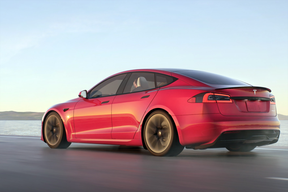Dutch forensic lab: Tesla holds on to your driving data for up to a year
Government investigators find Autopilot stores info on speed, accelerator pedal position, steering wheel angle, and brake usage

Article content
The Dutch government’s forensic lab said on Thursday it had decrypted electric carmaker Tesla’s closely guarded driving data-storage system, uncovering a wealth of information that could be used to investigate serious accidents.
Advertisement
Article content
It was already known that Tesla cars store data from accidents, but the Netherlands Forensic Institute (NFI) said it had discovered far more data than investigators had previously been aware of.
The NFI said the decrypted data showed Tesla vehicles store information about the operation of its driver assistance system, known as Autopilot. The vehicles also record speed, accelerator pedal position, steering wheel angle and brake usage, and depending on how the vehicle is used, that data can be stored for over a year.
“These data contain a wealth of information for forensic investigators and traffic accident analysts and can help with a criminal investigation after a fatal traffic accident or an accident with injury,” Francis Hoogendijk, a digital investigator at the NFI, said in a statement.
Advertisement
Article content
Tesla did not immediately respond to a request for comment.
The Dutch lab said rather than seek the data from Tesla, it had “reverse-engineered” data logs – a process where software is deconstructed to extract information – present in Tesla vehicles “in order to objectively investigate them.”
The NFI investigated a collision involving a Tesla driver using Autopilot and a car in front of it that suddenly braked hard.
The investigation showed the Tesla driver reacted within the expected response time to a warning to resume control of the car, but the collision occurred because the Tesla was following the other vehicle too closely in busy traffic.
Advertisement
Article content
“That makes it interesting, because who is responsible for the following distance: the car or the driver?” said NFI investigator Aart Spek.
These data contain a wealth of information for forensic investigators and traffic accident analysts
Francis Hoogendijk, NFI digital investigator
The NFI said Tesla encrypts its coded driving data to keep its technology secure from other manufacturers and protect driver privacy. Car owners can request their data, including camera footage, in the event of an accident.
The NFI found that Tesla had complied with data requests from the Dutch authorities, but left out a lot of data that could have proven useful.
In August, the U.S. National Highway Traffic Safety Administration (NHTSA) opened a formal safety probe into Tesla’s Autopilot system in 765,000 U.S. vehicles after a series of crashes involving Tesla models and emergency vehicles.
To date, NHTSA has identified 12 crashes that involved Tesla vehicles using the advanced driver-assistance systems and emergency vehicles. NHTSA said most of the incidents took place after dark.


